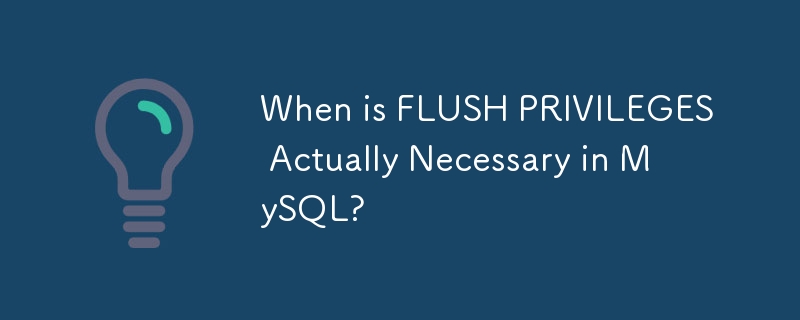

MySQL: Understanding the Role of FLUSH PRIVILEGES
When managing user privileges in MySQL, it is not always necessary to use the FLUSH PRIVILEGES command. However, there are specific scenarios where this command becomes crucial.
When FLUSH PRIVILEGES is Unnecessary
Scenario 1: Granting Privileges Using GRANT
As mentioned in the question, granting privileges directly through the GRANT statement does not require FLUSH PRIVILEGES. MySQL immediately recognizes these changes and reloads the privilege tables.
Scenario 2: Indirect Privilege Modifications
Modifying privileges using account-management statements such as REVOKE, SET PASSWORD, or RENAME USER also automatically triggers MySQL to reload the privilege tables.
When FLUSH PRIVILEGES is Essential
Scenario 1: Direct Modification of Grant Tables
If you make direct changes to the grant tables using INSERT, UPDATE, or DELETE statements, FLUSH PRIVILEGES is necessary for MySQL to recognize and apply those changes. Failure to execute FLUSH PRIVILEGES in this case will result in the changes being ignored until MySQL is restarted.
Scenario 2: Synchronization After Manual Grant Table Manipulation
In rare cases, you may manually modify the grant tables using external tools or scripts. In such scenarios, executing FLUSH PRIVILEGES is essential to synchronize the changes with MySQL's internal privilege cache.
Scenario 3: Post-Configuration Changes
If you make changes to configuration files (such as my.cnf or my.ini) that affect privilege management, FLUSH PRIVILEGES should be executed to ensure that the changes are applied consistently.
Conclusion
In summary, the FLUSH PRIVILEGES command is primarily needed when you have made direct modifications to the grant tables or after certain configuration changes. For regular privilege management operations through GRANT or indirect statements, FLUSH PRIVILEGES is unnecessary and can be safely omitted.
The above is the detailed content of When is FLUSH PRIVILEGES Actually Necessary in MySQL?. For more information, please follow other related articles on the PHP Chinese website!




